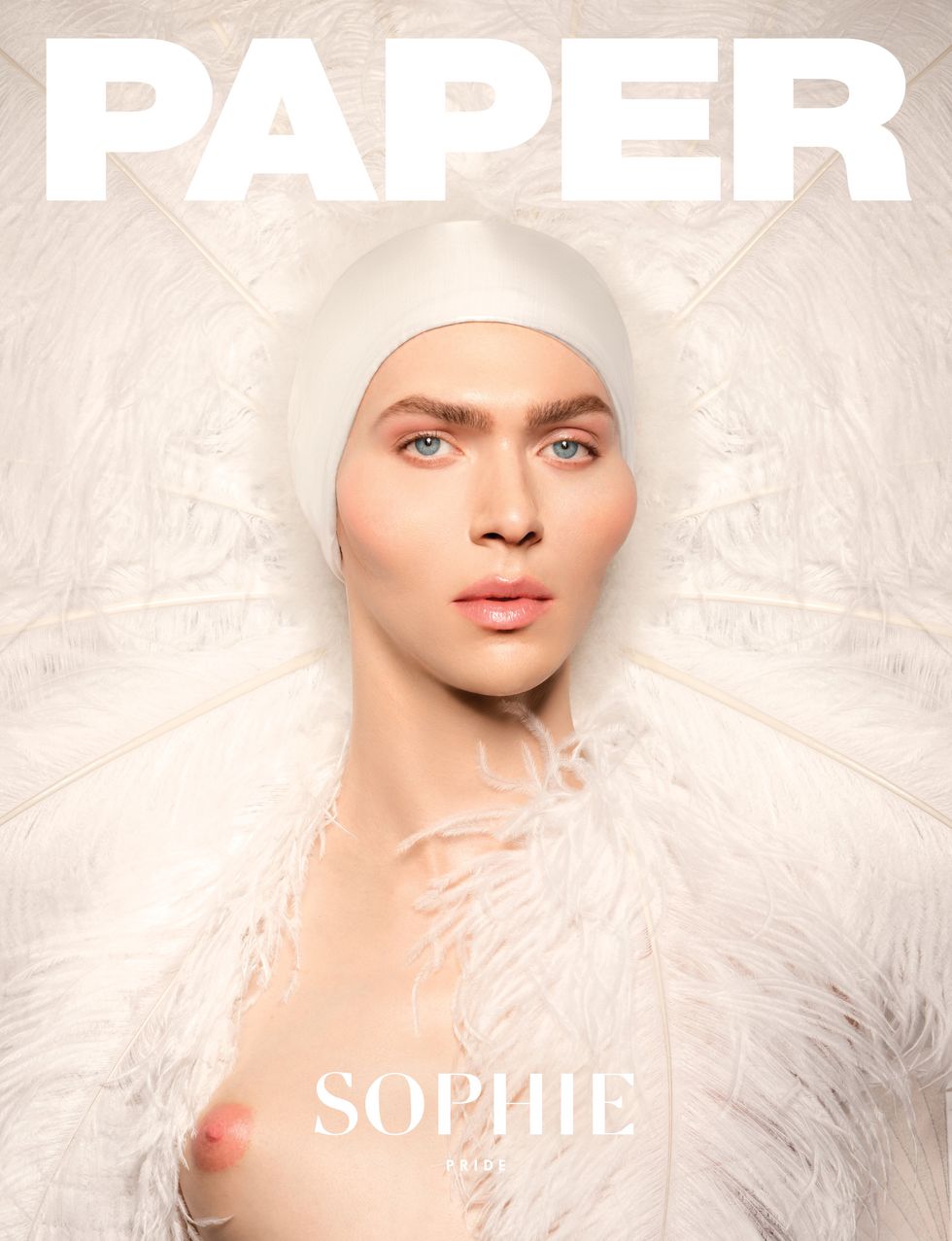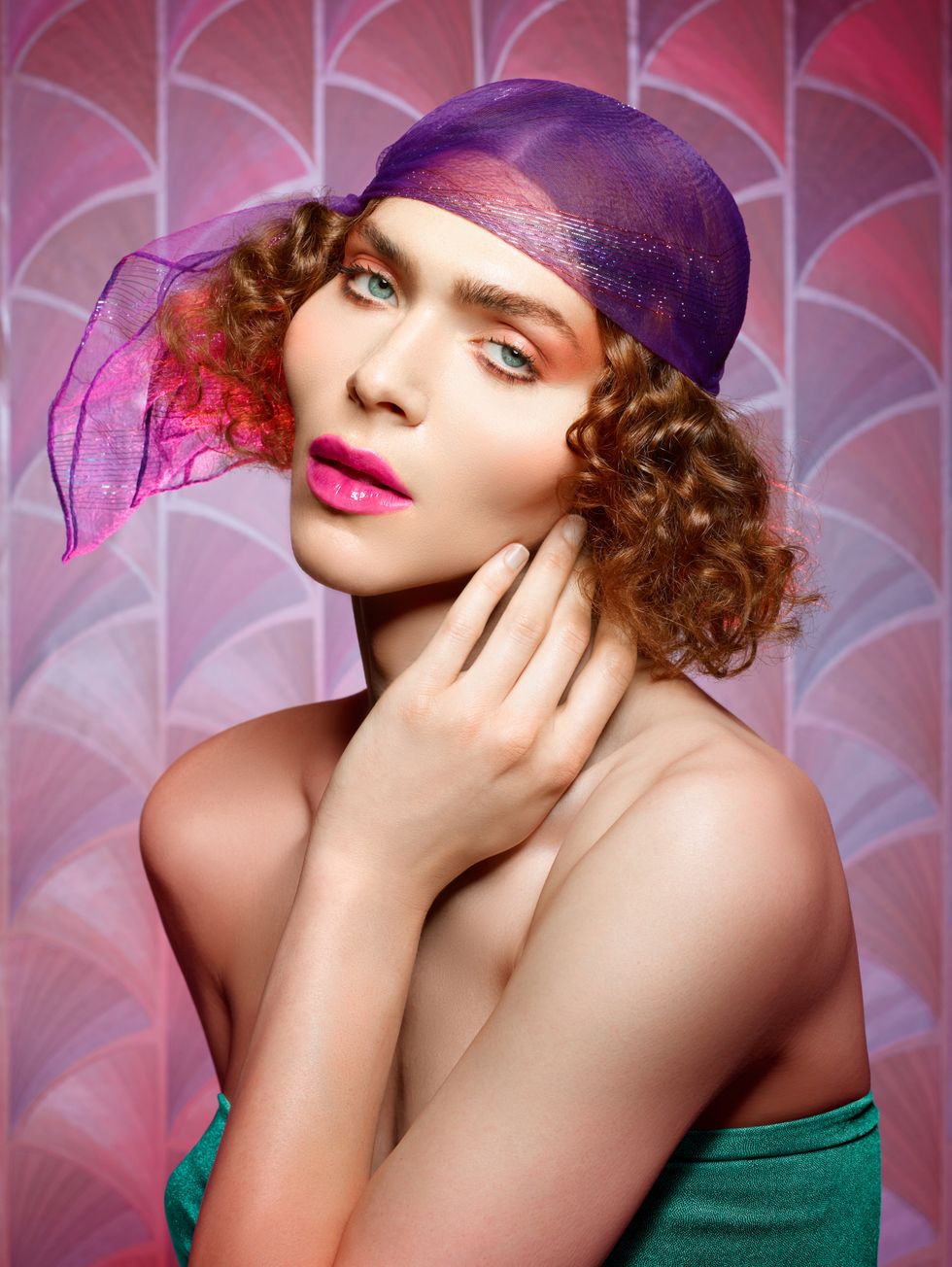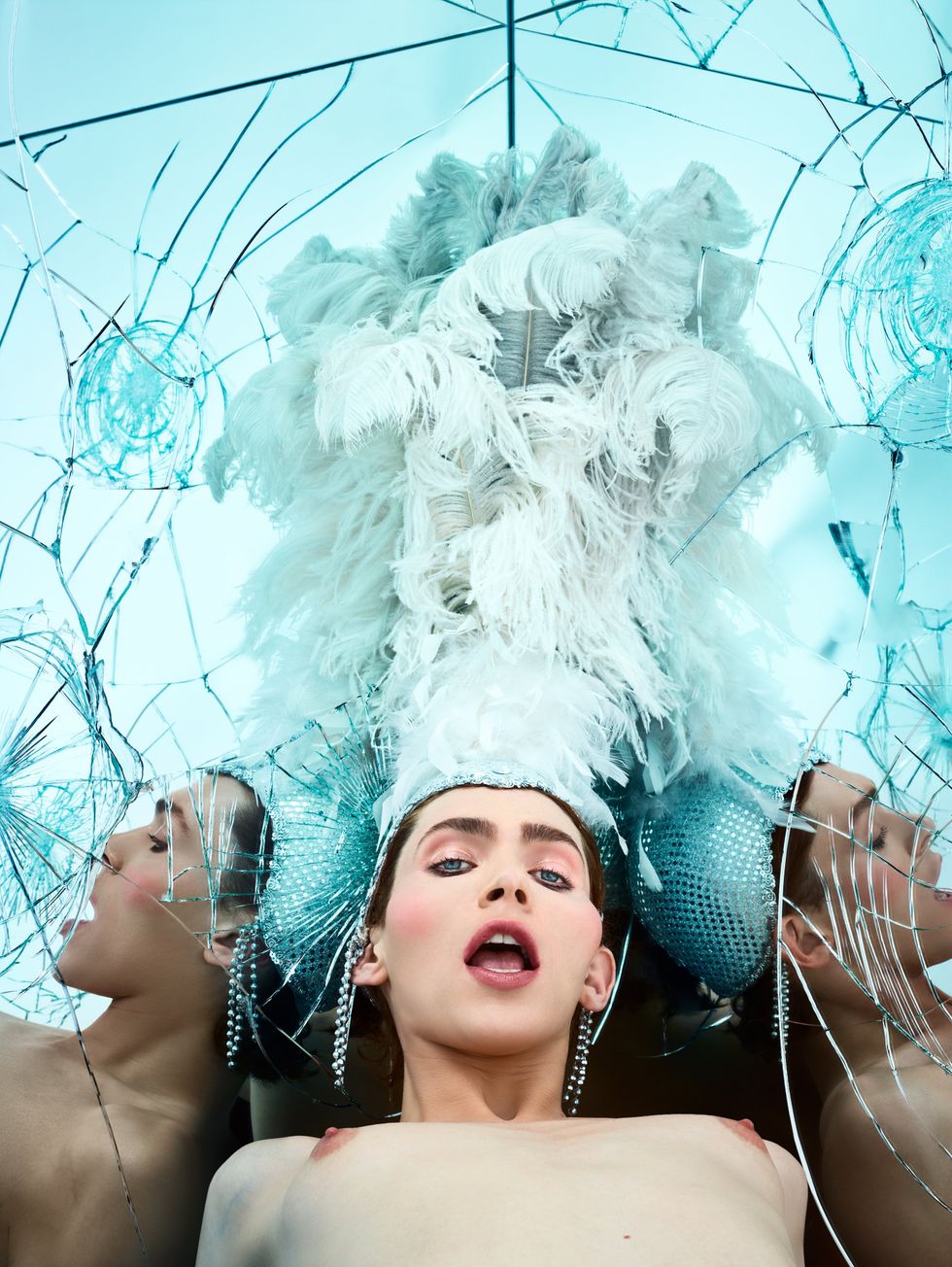
For years, SOPHIE's name was shrouded in mystery, attached anonymously to the futuristic pop sounds of her 2015 PRODUCT EP, which featured early bubblegum bangers "HARD" and "LEMONADE." SOPHIE had no age, no gender, no face, no origin — only associations, including her work producing for major artists like Charli XCX, Madonna and Vince Staples.
Which is why SOPHIE's debut single and music video, "It's Okay to Cry" was such a profound statement, introducing SOPHIE for the first time ever as a trans pop star singing intimately about embracing her emotions and flaws. "I hope you don't take this the wrong way/ But I think your inside is your best side," she whispers, her voice digitally altered above gentle, melodic production that builds into an explosive, cinematic finale.

The track opens SOPHIE's debut album, Oil of Every Pearl's Un-Insides, though it's a bit of an outlier in the LP's sprawling lineup. "Ponyboy" immediately destroys expectations for something tender, with its bone-crushing and sexually charged lyrics: "Spit on my face/ Put the pony in his place," SOPHIE demands, her voice pitched down with a devilish bite. On "Faceshopping," SOPHIE makes the argument, "I'm real when I shop my face," against squealing and bubbly blips. Oil is anchored with songs that sound like swimming in a sea of mercury, dancing in a hurricane of solemn synths and surviving an unruly car crash, before "Immaterial" unloads SOPHIE's euphoric hyper-pop and "Whole New World" crash lands to wrap up the impressive effort.
Her entire album is wildly ambitious — thematically and sonically — but it exceeds the impossible hype built by years of buzz surrounding SOPHIE's work. Using her keen understanding of pop music, SOPHIE dissects and reconstructs every element through her songs to critique and celebrate the mainstream market. Within the context of society, an artist like SOPHIE is cruelly marginalized, but in her Whole New World she's a viable pop performer, packaging outsider ideas with addictive sounds designed to compete with contemporary chart-toppers. Oil's final chant, "Whole! New World!" underlines this proposition, making it impossible to imagine any future without SOPHIE on top.
For PAPER Pride, we invited SOPHIE and girlfriend/model Tzef Montana to sit down and talk candidly about making hit songs, embracing transness and taking hormones.
Tzef Montana: Hey SOPHIE, how are you?
SOPHIE: I feel energized.
Where do you get this energy from?
Being with my girlfriend.
Your debut album just came out. Are you excited to go on tour?
Darling we're always on tour.
What's been the biggest highlight promoting your album thus far?
Talking to people when I go to different cities, because then I spend time with people that I actually think get it more.
Have you ever worked with Kendrick Lamar?
I made a song [called "Yeah Right"] with my friend Vince [Staples], and then Vince sent it back and Kendrick had done something on it. Then we edited the vocals and tried to overproduce the song. They wanted it a bit more raw, but then they left it anyway and people liked it. Vince was playing it all the time.
What do you think of Pride?
Everyone should fuck with Pride. I'm excited to be performing at Traición Pride in Mexico City.

What's the relationship between your music and sex?
[I'm] definitely interested. You can learn things about people from sex. I want to be a bit more literal about it, but using it metaphorically is more fun I suppose.
Which one of your songs would you play while having sex?
"Take Me to Dubai" — a track I recently made and haven't released. From this album, probably "Immaterial." It's the cheapest of all of them.
Why cheap?
I don't know, I mean kind of mainstream.
Do you trust other people easily?
I try to give people the benefit of the doubt until we have a chance to really connect.
Do you believe in God?
Yes, God is Trans.
Do you believe in star signs?
I think that's a better way to discuss what might be different about people than any of our current language.
What is it like to be a producer today?
I think it's up for definition, really. I would like to present some ideas about what could define a producer. It was something different for me and my friends in London where we would just work with whoever was around us, you know, because we are inspired by our friends. That's what I've always done: collaborate with friends because they are the people who understand. If you are a good friend you understand someone on a different level.

Gloves: Syren
But you also really understand pop music.
Yes I do, but I was never into pop music as a child. It was always strictly electronic music that I was into. I was not interested in any guitars.
Do you understand what makes a hit song?
I do, yes. I think I have some more clear ideas about that right now. I've been searching for that for a very long time. It's just the case of all of the skills that you've taught yourself coming together I suppose — or just being natural with it. That's what I think.
So what makes a hit song?
I don't think there are any rules. I think it's about connecting with people. That's the most exciting thing about pop music. It's worldwide. You can use it with really effective messages. You can choose to abuse the power a catchy song gives you, or you can use it to your advantage for good purpose. I suppose that's what I try to do.
"Everyone should fuck with Pride."
Is there a secret formula?
I don't know. I've kind of tuned out of it a bit, but there's always that one song that sets the trend and then everyone copies it. And while I go enjoy those copies, I am more interested in the original. So I'll look into a Chainsmokers track closely because that connected on a deeper level that is going to be in music history books. I think individual songs like that have a special feeling and I tend to spend more time listening to them.
Beyond theory, isn't there a side to what you do that's very mathematic?
Yes that's true. The really interesting thing about that is how the universe and sound waves are connected through something like physics.
How important is production in a song?
I think it's everything. It could be even more though. As soon as people's ears open up and they are ready for it, then you can take it in very weird places.
Do you think producers are credited enough?
They could be more. The people who inspired me were always producers, more so than songwriters or performers.

Dress: Armature, Sunglasses: Acne
But now you are the performer, too.
I just see what comes out. I'm trying to find something natural ultimately — like a performance is part of it, but again it's more about how much I can connect with people.
Where do you think music is heading?
It's gonna be exciting. The people that have the loudest voices that need to be heard are gonna be the ones we're gonna be listening to, and not the voices of people manipulating them from whatever sources of power they have.
How does embracing being a trans girl affect your life?
An embrace of the essential idea of transness changes everything because it means there's no longer an expectation based on the body you were born into, or how your life should play out and how it should end. Traditional family models and structures of control disappear.
"Transness is taking control to bring your body more in line with your soul and spirit."
What is transness to you?
For me, transness is taking control to bring your body more in line with your soul and spirit so the two aren't fighting against each other and struggling to survive. On this earth, it's that you can get closer to how you feel your true essence is without the societal pressures of having to fulfill certain traditional roles based on gender. It means you're not a mother or a father — you're an individual who's looking at the world and feeling the world. And it's somehow more human and universal, I feel.
How does society dictate gender?
It's tradition. If you're straight from the factory, your life should have a certain look and come with a certain short list of factors that you have to fulfill in your own way. But because of the body that you're born into, it's your obligation to satisfy as many of those as possible and that defines being successful. As a trans individual, it's more about going through a personal journey of discovering yourself. There's something a lot more spiritual about that, and what's possible once you reach that place is the ability to then look at other people not with judgement — not like anyone's trying to take anything away from you, but with an openness.
Are you inviting other people to embrace that philosophy?
I think a philosophy is a dangerous way of putting it. There's no more rules here. The point is you are given the authority to choose yourself what feels right — what's going to allow you to live your best life.

Do you think it's something that is new today?
Well, it's a bit of a trojan horse situation where things have been superficially embraced for a long time based on a media circus of superficial acceptance. "Oh, I know what transgender is, so I can accept it on a certain level. And also I'm going to have a certain number of transgender people in every campaign."
So you think there's substance to true transness now in entertainment?
People have been trans for a long time if you think about any of the people who have been really influential like Madonna, Bowie, Prince — people like that have shifted culture in this way that gets us as far down that path as possible. Like, it's yours to choose. We're all thinking, feeling beings in a very complex world, and we should be using every technology and information around us to adapt us in this world. It's an evolutionary thing.
Would you say it's a movement?
I guess time will tell. It's impossible for anything to stay static.
Who are some of the voices that you think need to be heard?
Along with other friends of mine, one of the people I've been working with is Juliana Huxtable and that's a collaboration that I'm very invested in because I think that person has experiences that are important for the world to learn from. She seems to have, as demonstrated through her book, a way of viewing the world that is different and visceral and emotional. I think pop music is a great way for people to hear those thoughts. Putting that content within mainstream pop music is how the messages can spread the widest and fastest and in the truest form to themselves as possible. Because everything gets distorted. If you put it in an art gallery context, you're playing with the same patriarchal system. I mean, you could say the same thing about pop music too, but I think giving people the power to have their voices heard is really important.
Hormones [Shakes pill bottle]. What do you think about them?
I think it's different for everyone. For you, as you've expressed to me, it's not anything you feel you need. You don't need to be called by a woman's name and have tits to be like a woman. Personally, that's the body type I prefer, and I love having both male and female parts of my anatomy.
But having experienced the hormonal therapy transition...
The emotional effects — for me, it feels like you're more in control or aware of sexual urges. You're not being led by a force you don't understand that's kind of distorting your sense of what having a good life feels like. And when you take hormones, you can just be aware that these are the different control systems inside of me, and I want to take control of those things to try and find a balance for me that works — that feels good. That allows me to close things off and be myself — look at the world in the way I want to see it.
This interview has been edited and condensed for clarity.
Photographer: Jason Altaan
Creative Direction: Nick Harwood
Stylist: Lisa Katnic
Hair: Fitch Lunar
Makeup: Melissa Rogers
FX Artist: Cristina Waltz
Set Designer: Eamonn McGlynn
Post Production: Kyle Jackson
From Your Site Articles
- SOPHIE Closed Fashion Month at Louis Vuitton Spring 2020 - PAPER ›
- Arca, SOPHIE and Mowalola in Shygirl's "SLIME" - PAPER ›
- SOPHIE Shares Live Set From Canceled HEAV3N Party - PAPER ›
- Groundbreaking Artist and Trans Icon SOPHIE Dies at 34 - PAPER ›
- Groundbreaking Artist and Trans Icon SOPHIE Dies at 34 - PAPER ›
- SOPHIE Produced These 10 Iconic Songs - PAPER ›
- SOPHIE Gets Her Own Bratz Doll - PAPER ›
- SOPHIE Gets Her Own Bratz Doll - PAPER ›
- SOPHIE Gets a Bratz Doll - PAPER ›
- Artists Launch 'God Is Trans" Auction in SOPHIE's Memory - PAPER ›
- SOPHIE's Brother Confirms Posthumous Music in the Works - PAPER ›
- SOPHIE's "BIPP" Gets Its Only Official Remix From Autechre ›
- SOPHIE Premieres Remix of BAYLI's 'clown shit' ›
- LIZ Will Perform at FAKE and GAY in New York City ›
- Hole Pics Celebrates SOPHIE's Legacy ›
- Ben Long, SOPHIE’s Brother, Talks Posthumous Album - PAPER Magazine ›